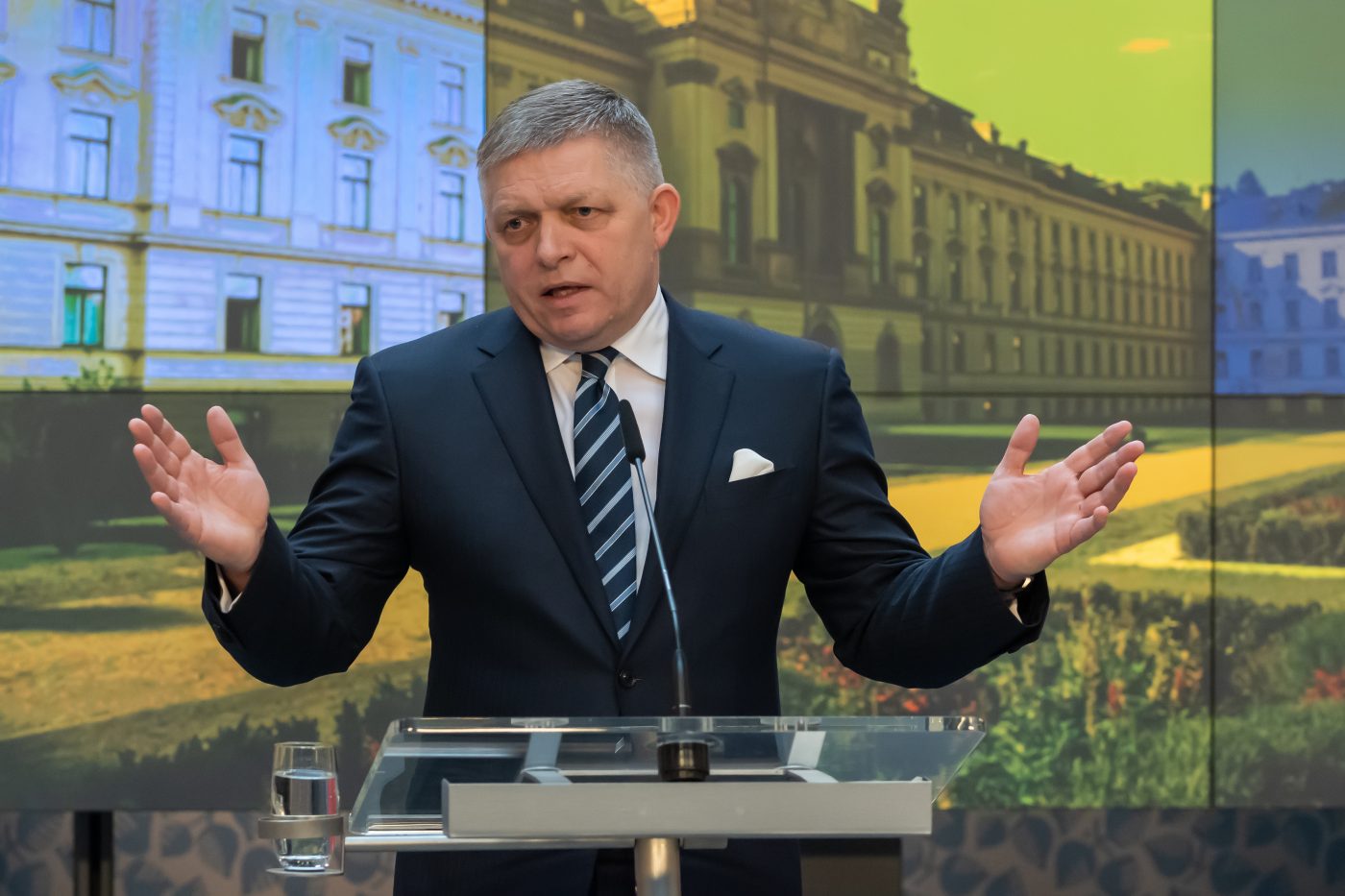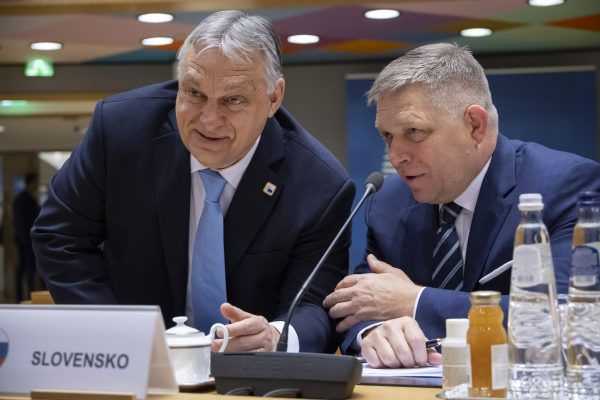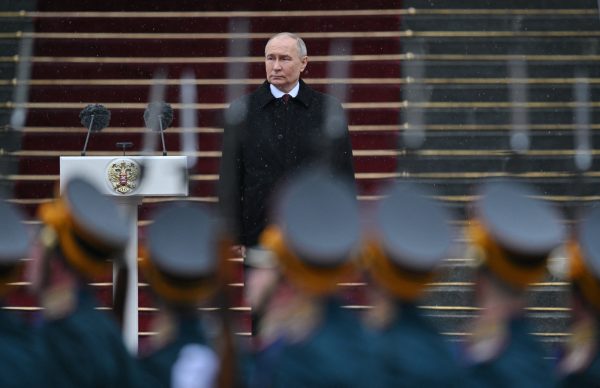The election pledge by Slovakia’s new prime minister, Robert Fico, of “not a single bullet to Ukraine“, seemed clear enough, and drove much Western commentary on the vote and its implications.
Here was a leader determined to reverse course and effectively put Russia before Ukraine, a charge also leveled against neighboring Hungary, which could therefore be seen as an ally. NATO solidarity on the Eastern Flank was beginning to fracture.
But as so often in Central Europe, politics are more complex than they first appear. Slovakia’s defense industry — with its ability to produce badly needed Soviet- and NATO-caliber weaponry and ammunition — has won rich contracts to produce armaments for Ukraine. Was Fico really willing to ditch this and harm those companies?
As it turned out, he was not. It transpired that Fico’s pledge carried a footnote — *this policy applies only to supplies from Slovak Armed Forces stockpiles, and in no way affects commercial, contractual deals.
This “clarification”, though not mentioned before the election, is now consistently echoed by the prime minister, Defense Minister Robert Kalinak, and Foreign Affairs Minister Juraj Blanar, all from Fico’s SMER-SD party. This uniformity in messaging suggests a strategic effort to ensure both domestic and international audiences get the memo.
This is a pragmatic approach. Konštrukta-Defense, a state-owned company known for the Zuzana 2 howitzer, reported record sales and net profit last year. Sales increased by 34% to nearly €85m $92.5m), and profits soared almost tenfold to €13.9m from €1.4m in 2021.
Similarly, ZVS Holding, another state-owned large-scale ammunition producer, saw sales of €44m in the first seven months of this year, surpassing last year’s total of €40m. The company is investing over €31m in new technology and expanding its production infrastructure. Both firms are based in Dubnica nad Váhom, part of the Trenčín district, the best-performing electoral region for Fico’s party and its coalition allies.
But while the new administration may be more moderate than thought on Ukraine, it is exhibiting a domestic focus that is harder to wave away. There are escalating attacks on civil society and media, a bending of the rule of law, and overall democratic backsliding. Meanwhile, international media, pundits, and policy analysts are primarily concerned with the government’s contrarian stance on military assistance to Ukraine and sanctions against Russia.
Data from the Ukraine Support Tracker by the Kiel Institute indicates that Slovakia ranks 13th in total bilateral military commitments, contributing €667m. When measured as a percentage of GDP, with 0.633% committed to military aid, Slovakia is the sixth largest supporter. Despite its relatively small population, Slovakia’s contributions have an important symbolic and political value, even though much of the aid consists of old, poorly maintained Soviet-era weaponry and various types of ammunition from stockpiles. The plus side to all this is that it has unexpectedly accelerated the modernization of Slovakia’s military, a development unforeseen before the invasion.
However, the current coalition government views the military assistance to Ukraine as a severe detriment to national defense capabilities, bordering on treason. Debates, particularly concerning high-profile military equipment like the two batteries of the S-300 air-defense system and handing Ukraine 13 MiG-29 Fulcrum fighter jets, have been intensely politicized. These debates have even led to several unsuccessful lawsuits against the interim government.
The government is nonetheless very interested in the defense industry, although it feels little warmth toward Ukraine (Politico suggests that this dates to Fico’s grudge at his treatment when he visited in 2009.)
The government has initiated a series of high-level management changes since it took power.
The Defense Minister dismissed Stefan Skultety, CEO of DMD Group, which wholly owns the subsidiary Konstrukta–Defence and 50% of ZVS Holding shares. Also, the CEO of Konštrukta–Defence, Alexander Gursky, was dismissed from his position. Gursky was a strong advocate and key figure within the company for prioritizing the Ukrainian market.
Some worry that this decision in particular could hinder the development of closer cooperation with Ukrainian industry. In the summer, Konštrukta–Defence signed a memorandum of cooperation with the PJSC Kramatorsk Heavy Duty Machine Tool Building Plant. This agreed to the joint development of a new 155mm howitzer and the modernization of the Ukrainian Bohdana artillery platform. Additionally, a trilateral agreement involving Ukraine, Slovakia, and the Czech Republic was reached for the joint procurement, maintenance, and operation of CV90, an infantry fighting vehicle produced in Sweden.
These projects and similar projects are now at risk. There’s a concern that they might be deprioritized or derailed as a result of politicization or indifference.
While Fico’s approach to major foreign policy issues like support for Ukraine might seem inconsistent, he shows a strong determination to fulfill his domestic promises and threats.
He has openly targeted certain media outlets, branding them as hostile towards his government, and has officially declared that he will cease communication with them. Moreover, he hinted that his cabinet might reassess governmental advertising spending in these media. In addition, there are plans to reform the Slovak public broadcaster, RTVS, by separating its TV and radio branches, a move that critics worry could lead to a full governmental takeover of the institution.
Meanwhile, the administration is also working on law enforcement. Several police investigators working on corruption cases involving members or nominees of the SMER-SD and Hlas-SD parties were sidelined from active duty. This action was taken despite their status as protected whistleblowers and a court decision declaring such a move by the Minister of Interior illegal.
Civil society too is under the spotlight. Proposals for a Slovak version of the repressive Russian foreign agents law and changing or halting a taxpayer’s right to assign 2% of their tax total, a vital funding mechanism for many civil society groups, are much discussed by coalition representatives.
These developments offer a clear indication of the new administration’s view of media, public broadcasting, law enforcement, and civil society in Slovakia. It is not a friendly environment.
Slovakia’s friends in the European Union (EU) and elsewhere would do well to remember this, and should not trade Fico’s support for a broad consensus on strategic issues in return for a blind eye to his illiberal approach to domestic opponents and independent watchdogs.
Matej Kandrík is Chief Executive Director and co-founder of the Bratislava-based Adapt Institute and a Ph.D. candidate in Political Science with a specialization in Security and Strategic Studies at Masaryk University in the Czech Republic. He has also researched at the National Defence University of Poland.
Europe’s Edge is CEPA’s online journal covering critical topics on the foreign policy docket across Europe and North America. All opinions are those of the author and do not necessarily represent the position or views of the institutions they represent or the Center for European Policy Analysis.





